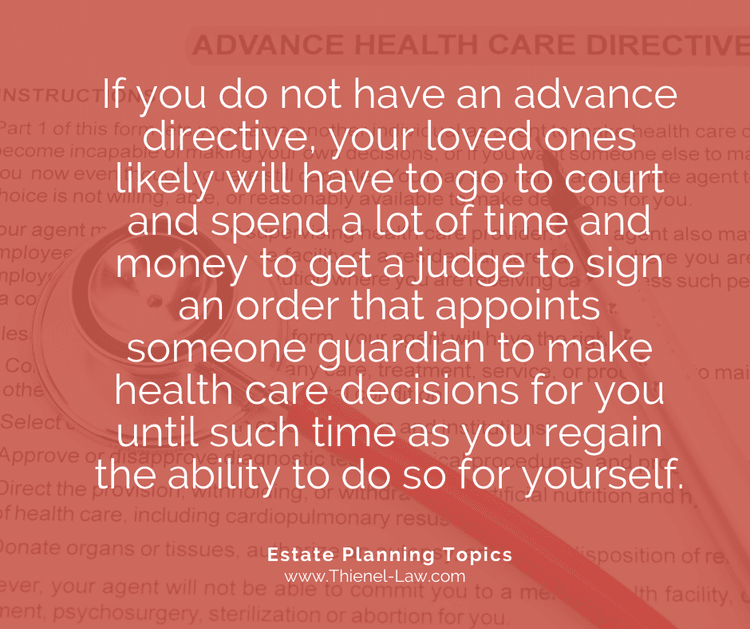What is the Procedure for Making Advance Directives in Maryland?
To have input on what happens if you become unable to make or express decisions about your health care, create and sign an advance directive. You have several options about the instructions you specify and the situations these legal documents cover.
You will want to get legal advice from a Maryland estate planning lawyer before making an advance directive. If you merely use a printed form, you might not receive all of the options that are available by law. Your lawyer can explain what the procedure is for making advance directives in Maryland.
What Is an Advance Directive?
In an advance directive, you state your wishes about your health care and choose someone to make your medical decisions for you if you can no longer speak for yourself. As long as you have the capacity to make and communicate decisions for yourself, you will be able to do so. An advance directive does not take away your control in that situation.
If you do not have an advance directive, your loved ones likely will have to go to court and spend a lot of time and money to get a judge to sign an order that appoints someone guardian to make health care decisions for you until such time as you regain the ability to do so for yourself. Depending on the situation, you might only need to have someone to step in for a few days or weeks.
Do You Have to Use a Specific Form for an Advance Directive?
No, you do not have to use a specific form. You do want to make sure that the form or document you use meets all the Maryland state law requirements to be valid and enforceable. The Maryland Attorney General's Office provides a Maryland advance directive form, but they stress that the form is optional. There are multiple versions of advance directive forms that honor a variety of religious perspectives.
There is a Physician’s Order form that allows emergency medical personnel to provide comfort care rather than aggressive lifesaving interventions. This form is also called Medical Orders for Life-Sustaining Treatment (MOLST) or an Emergency Medical Services/ Do Not Resuscitate (EMS/DNR) Order.
You can make an advance directive that addresses your preferences about mental health treatment rather than general medical treatment. This form is called the Advance Directive for Mental Health Treatment.
How Do You Get an Advance Directive Put in Place in Maryland?
After talking with your trusted advisors, like your doctor, loved ones, or spiritual advisor, many people then talk to a lawyer who can explain their options and craft a document tailored to their specific wishes and needs. After you read the legal document, it will be time for you to sign when you are ready.
You will have to sign the advance directive in front of two witnesses. The witnesses must also sign the document. The person you designate as your health care agent cannot be one of the witnesses. In Maryland, advance directives do not have to be notarized.
Copies of advance directives are just as valid as originals. You should give a copy of your advance directive to your doctor to keep in your medical file. Your designated health care agent should have a copy, as well as other trusted individuals as appropriate.
Maryland law allows you to create a valid advance directive merely by talking to your doctor in front of a witness. There are known problems with this method, including your doctor having to remember the terms you requested, considering the number of patients a typical doctor has. It is best to put such an important matter in writing.
What Is the Difference Between an Advance Directive and a Power of Attorney?
A power of attorney is a document that an individual signs ahead of time that designates someone else to take certain actions on behalf of the person who created and signed the document. A power of attorney can be for one of many different purposes.
You might have a power of attorney for someone to manage your financial matters while you are on a trip to Antarctica or to sign real estate closing documents on your behalf if you will be out of town on the closing date. A medical power of attorney, on the other hand, designates a health care agent of your choice to act on your behalf and authorize medical treatments and make other health care decisions if you are unable to do so because of an illness or injury.
An advance directive, on the other hand, only addresses health care decisions. An advance directive could focus solely on mental health treatment, or the paper could cover other medical decisions. An advance directive can identify specific medical treatments the individual does or does not want to have, for example, hospice or a Do Not Resuscitate Order.
What Has to Happen Before My Advance Directive Gets Used?
If your advance directive names a specific person to serve as your health care agent, your document should specify the circumstances under which you want the person to act on your behalf. For example, your advanced directive might say you want your designated health care agent to make medical treatment decisions on your behalf in any of these situations:
If you have a catastrophic injury like head trauma from a car accident that leaves you unconscious for at least X number of hours or days.
If your physician places you in a medically induced coma because of an injury or illness.
If you have a stroke or another medical emergency that leaves you temporarily or permanently unable to make or communicate your health care decisions.
If your medical condition, such as Alzheimer's disease, progresses to where you are no longer capable of making your medical decisions.
Any other situation in which your doctor certifies in writing you are not capable of making decisions about your medical care or treatments.
These instructions allow you a great deal of control about when your designated health care agent may step in and decide for you.
Whether you named someone to serve as your health care agent or not, typically, health care providers do not honor advance directives and allow someone else to make your healthcare decisions until your doctor certifies in writing you are not capable of making decisions about your care. The rationale behind this general rule is that placing your health care in the hands of someone else makes you vulnerable.
Can My Advance Directive Contain Instructions About Hospice and Palliative Care?
Absolutely. People with incurable or terminal conditions sometimes sign advance directives stating that as their end-of-life approaches, they do not want their health care providers to use extraordinary measures to try to prolong their life, which could include a ventilator, feeding tubes, CPR, or other medical treatments.
Instead, they wish to go peacefully while receiving hospice and palliative care to manage their pain. Hospice and palliative care can provide other supports in addition to medicine for pain relief.
What Should I Do If I Want to Change the Person I Named as My Health Care Agent?
As long as you still have the legal capacity to sign this type of document, you can make as many changes as you want, as often as you want. Your changes will need to comply with the state law requirements about signatures and witnesses.
Sometimes, people want to designate a different person to serve as their health care agent because the original person died or moved far away. If you designated your spouse as your health care agent and sometime later, you got a divorce, you are unlikely to want your former spouse to serve in that capacity.
It is seldom possible to track down and retrieve all the copies of your previous health care directive after you make changes. You need not worry too much about that situation, because the most recent health care directive will be the one the health care providers and courts will honor.
How Can Emergency Medical Personnel Find Out That I Have an Advance Directive?
You can carry a card in your wallet that notifies health care workers you have an advance directive and gives them the name and contact information of your health care agent. You can get the blank wallet card form from the Office of the Attorney General of Maryland or from the American Hospital Association (AHA).
The AHA’s wallet card is called “Put It in Writing.” Whatever type of wallet card you use, be sure to carry it in your wallet or billfold.
Does Maryland Allow Electronic Advance Directives?
Maryland permits the use of electronic advance directives. Our state recognizes individual companies that provide these services. For a fee, you can set up an account with one of these electronic advance directive service providers and share your information with your health care providers.
A Maryland probate lawyer could draft your advance directive as well as other documents, like a revocable trust that could help you avoid probate. Call Steve today for assistance in planning and administering your estate.



